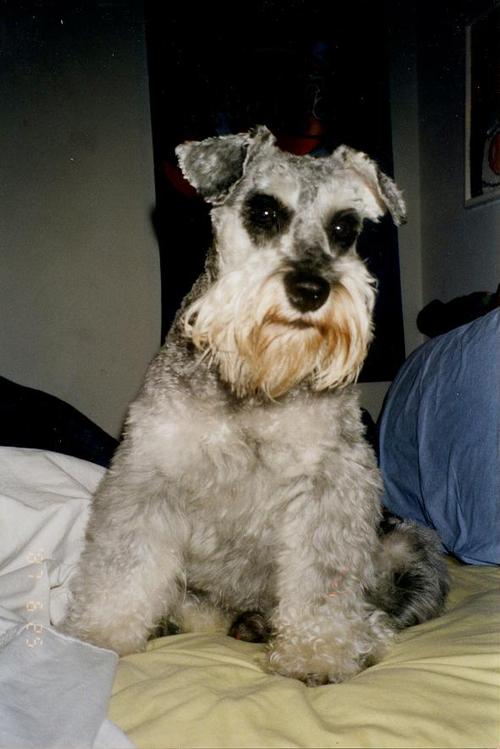Wyatt
Wyatt is a miniature schnauzer. Yet as he props himself up hind-legged, he can without fail paw me awake. Through our roughly two years side by side, he has developed a répertoire of innocent-appearing techniques to get me up. He can quickly develop a sneezing fit, or, if that doesn’t work, he can bay deep-mouthed enough to wake the dead. But his most successful approach is the simplest. He sits quietly beside the bed and stares into my face with sweet and forgiving aplomb; I come out of deep sleep with the feeling of being watched. If I even blink, he puts his noble scimitar of a nose close to my ear and licks; opening my eyelids, I am confronted with an insinuated snout that usually means “Why” would like to salute a tree or, if I move too slowly, a couch. Often the contest of wills goes on for minutes, I squinching my eyes shut and he knowingly persisting. In the end “adogableness” prevails, and in the company of a heartbeat at my feet, I amble to the front door to let Wyatt go about his ceremony.
He doesn’t have to think to do it well; in fact, in some respects Wyatt is more intelligent than I, and in others he is abysmally ignorant. He can’t read, can’t drive a car, and has no comprehension of mathematics; on the contrary, as Ezra Pound once testified, “When I carefully consider the curious habits of dogs / I am compelled to conclude / That man is the superior animal. / When I consider the curious habits of man / I confess, my friend, I am puzzled.” To be sure, in his tour of duty that he is now practicing on the familiar brick flowerpots, the slow, imperial smelling over and anointing of an area, followed by the ambivalent turning this way and that to perfect range and trajectory, “Sir Wupford of Wayforth” has no peer. He may be a dog, but don’t tell me that he doesn’t have a real grip on life. Of course his horizons are limited, but how wide are mine?
When Wyatt is washed, he is as pleased with himself as is a woman newly patinaed by a beautician. His legs are combed columns, his salt-and-pepper hair is like silken velvet, and he carries the pompon of his tail—which is not much, although I’m attached to it—like the baton of a bandmaster. A chin of neatened whiskers gives him the air of an aristocrat. I happen to know, however, what this cavorting beauty looks like without the decking out. His paws matted and coat mildewed by the rain, he is a runt. Behold, under those brawny towers of legs are spindly shanks, thin and not too straight. His tail, trimmed too short at infancy, contrasts his Dumbo ears; with his chest ruff stripped, one can see the stomach of a growing boy. His whiskers become shaggy, and his seemingly proportionate rumpus rotund. But if Wyatt is in the least aware of his imperfections, he is complacent.
Wyatt reflects this bravado in eating, which, like all his undertakings (and many of ours), is paradoxical. Outdoors, where to him the world is a smell, never is his insatiable appetite slaked and he will ravenously accommodate twigs and branches. Indoors, where our wine-and-cheese prince is dished up sirloin and salmon, he scrutinizes such delicacies with fastidiousness. Rejecting canine chow altogether, he extracts, with the precision of a D.N.A. scientist, all human food from his thoroughly mixed bowl. No shrinking violet, Wyatt has us convinced that he is a person with fur.
Indeed, this “dog,” with his wet, delicate, exploratory nose, is to his limbs an investigative reporter—mischievous, assertive, and, above all, acutely curious. With high-hat gravitas, he pontificates in his self-appointed job of sentry, even as he shrinks in fear at his shadow. He is without question a coward, so deep-seated a coward that he has patented a technique for concealing it. Still, this alpha gives every indication of wanting, in the middle of the night, to go out and murder the strident animals that prowl our backyard and that outweigh this bite-size pooch ten to one.
And yet Wyatt’s perceptions are keen; he is a mind reader. Before a plan is half formed in my mind, “Wupsters” knows about it, namely, whether he is included. I know too well his look of puppy purity and dejection—an animal can express more with its tail in seconds than a human can with his tongue in hours—when I have just thought that I must leave him at home. In actuality, not everyone thinks him as much a person as my mother and I do. But like me, like my pooch, for as the French say, the best thing about a man is his dog.
Dogs love company; they place it on their nominal list of needs. So scratch “Why,” and you’ll receive permanent employment; find the spot behind the ears that he delights to have rubbed, and you’ve thereby replaced me. In Wyatt there is such affability, such loving kindness, such a way of crouching along to lay his force, his courage, and his heart at my feet, that it is a dog who has clarified my concept of friendship. Incapable of deceit and full of fidelity, he is, as Lord Bryon said of his furry friend, “the firmest friend, the first to welcome, the foremost to defend.” He asks no questions, passes no judgment; to bestow his heart is his one aim. He offers love unflinching, and asks only for it requited. So he soils the carpets, chews my slippers? I wouldn’t have it any other way.

 Comments
Comments